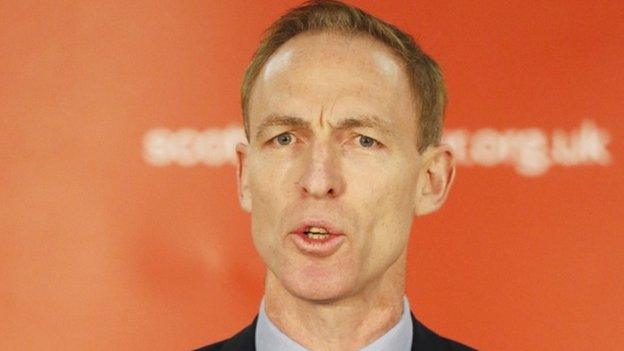General Election 2015: Poll suggests political figures could lose seats to SNP
- Published
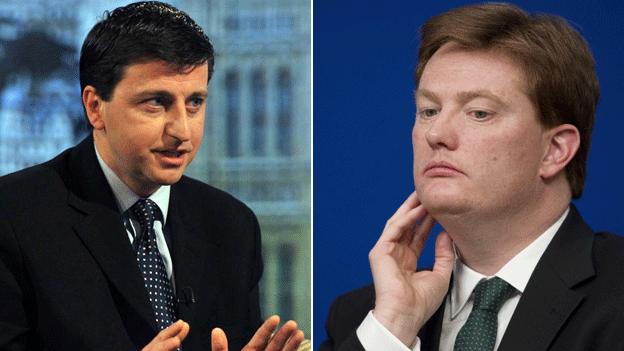
Douglas Alexander and Danny Alexander will fight for re-election in the May election
A new poll by a Tory peer has suggested Labour's Douglas Alexander and Lib Dem minister Danny Alexander could lose their Westminster seats to the SNP.
Lord Ashcroft looked at 16 Scottish constituencies and indicated the SNP was ahead in 15 of them.
The research comes as other polls suggest the nationalists are on course to win more UK parliamentary seats.
Currently Labour has 41 MPs, the Lib Dems have 11, the SNP has six and the Tories have one.
This latest survey, external took place between 5 and 30 January and involved telephoning 16,007 adults - the majority of whom live in areas where more voters said "Yes" in the Scottish independence referendum than said "No".
It suggested that of the seven Glasgow seats held by Labour, six could be lost to the SNP.
It also polled in the Inverness and Gordon areas where the majority opinion in the referendum was "No".
Party swing
One thousand adults were surveyed, external in the Inverness, Nairn, Badenoch and Strathspey constituency of Chief Secretary to the Treasury, external Danny Alexander.
They were asked a series of questions including: "If there was a general election for the Westminster parliament tomorrow, which party would you vote for?"
Ten percent of respondents said they would vote Lib Dem, with 38% saying they would back the SNP.
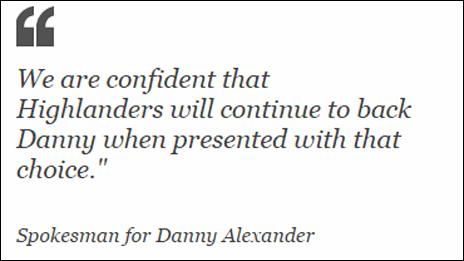
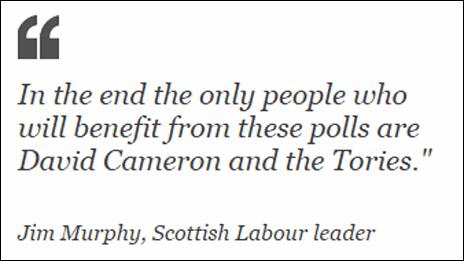
A spokesman for Mr Alexander said the election in the Highlands was between a "nationalist candidate who wants to use the Highlands as a 'step on the road' to independence, or Danny, who for 10 years has delivered for Highlanders".
He added: "With the SNP determined to re-run the referendum they have taken their eye off the ball, with Highland issues always coming second to their separation obsession.
"We are confident that Highlanders will continue to back Danny when presented with that choice."
In Douglas Alexander's, external Paisley and Renfrewshire South constituency - which he held with a majority of 16,614 in 2010, external - 1,000 adults were interviewed.
Again, interviewees answered a series of questions including: "If there was a general election for the Westminster parliament tomorrow, which party would you vote for?"
Based on what they said, the poll indicated the Labour politician would win 28% of the vote but would still lose the seat to the SNP, suggesting the party would gain 38% of the vote.
Biggest party
Commenting on the Ashcroft poll, Scottish Labour leader Jim Murphy admitted his party was "well behind and has a big gap to close".
However, he added: "But in the end the only people who will benefit from these polls are David Cameron and the Tories.
"It is a simple fact that the single biggest party gets to form the next government.
"The more seats the SNP get from Labour, the more likely it is the Tories who will be the biggest party and David Cameron will get into government through the back door.
"That would be a terrible outcome for Scotland but it's what might happen if Scotland votes SNP."

Follow the election story

Keep up-to-date with all the twists and turns of general election campaigning by going to our politics pages.
Have a look at our poll tracker on the UK-wide picture.

In an online blog, external, Lord Ashcroft said that most of his constituency research was focused on marginal seats.
However, he explained that in a post-referendum Scotland, the concept of a marginal seat was "rather obsolete".
After publishing the research, Lord Ashcroft cautioned: "As ever, it is vital to remember that these polls are a snapshot, not a prediction."
He added: "The Labour majorities in some of these seats are such that even a swing of this magnitude has not put the SNP far ahead - for example, just three points in Glasgow South West and Coatbridge, Chryston and Bellshill, and six points in Glasgow North West.
"With a vigorous Labour campaign there remains room for movement before May."
'Nothing for granted'
SNP leader Nicola Sturgeon said the set of polls was "encouraging" for her party.
She told the BBC: "They show that Labour is paying a heavy price for its alliance with the Tories and the people understand that the way to make Scotland's voice heard at Westminster, loudly and clearly, is to vote SNP."
However, Ms Sturgeon added that her party was taking "nothing for granted" and would be working flat out right up until election day.
The leader of the Scottish Conservatives, Ruth Davidson, said the poll "confirms that Ed Miliband simply isn't trusted by Scots".
She added: "It's increasingly clear that we face a choice between the security and leadership of the Scottish Conservatives, and the total chaos of a weakened Labour Party which staggers over the line thanks to SNP back room deals."
Voters will go to the ballot box on 7 May to choose who will represent them in Scotland's 59 Westminster constituencies.

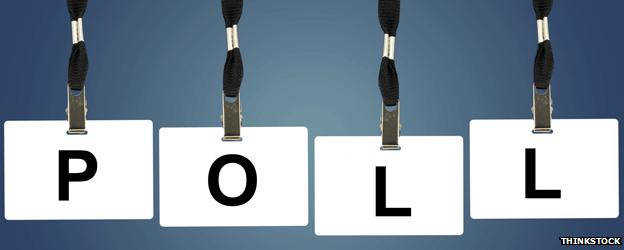
ANALYSIS
By political editor Brian Taylor
On one occasion, George Robertson (he was Labour's Shadow Scottish Secretary and it was 1997) told me that devolution would "kill the SNP stone dead".
So, just how is that project going? Not too wonderfully, it would appear, if one is to place credence in the poll of Scottish constituencies just published by the Tory peer Lord Ashcroft.
Of course, there have been other minor indicators that Plan Robertson was somewhat awry. For one, the presence of an SNP majority government at Holyrood. For another, a series of Scotland-wide polls suggesting a substantial SNP lead.
But Lord Ashcroft's poll is notably sore for the SNP's opponents, indicating as it does a significant SNP advance. The peer polled 1,000 voters in each of 16 Scottish seats, mostly choosing to investigate areas where there was a big Yes vote in the referendum.
His data suggests that the SNP would take 15 of them - including the seats held by Danny Alexander, Douglas Alexander and Margaret Curran. Alex Salmond would win in Gordon. Only William Bain, in Glasgow North East, would surmount the SNP tide........

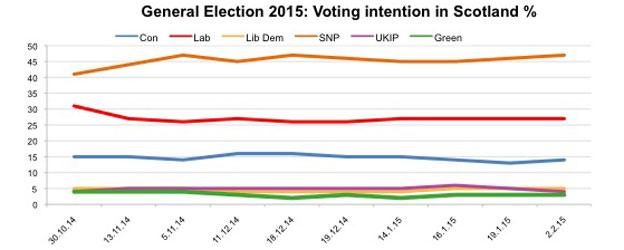
Each dot on the graph represents the last reading of the average of four (SOURCE: What Scotland Thinks)
ANALYSIS
By Professor John Curtice, Strathclyde University
Overall the Ashcroft polls point to a 25 point swing from Labour to the SNP - even bigger than the 21 point swing recorded on average by the most recent polls.
Labour might though still hope that the nationalist tide is not so strong where the "Yes" side did not come ahead in the referendum - places such as Fife, South Lanarkshire and Edinburgh where the party also has plenty of seats but where Lord Ashcroft did not poll.
However, Lord Ashcroft also polled in two seats that the Liberal Democrats are trying to defend, Inverness and Gordon.
Both of these are in parts of Scotland where the "Yes" side was clearly behind in the referendum. Nevertheless, the advance in SNP support in these seats since 2010 is just as strong - up 21 points in Gordon and no less than 31 points in Inverness.
Even so, today's polls also underline the potential fragility of the SNP's position.
In half of the Labour seats in which he polled, Lord Ashcroft reckons the SNP's lead is less than 10 percentage points. In these cases a relatively small swing back to Labour could yet see Jim Murphy's party emerge as victor. There is still an awful lot to play for in the three months between now and polling day.....
- Published4 February 2015
- Published4 February 2015
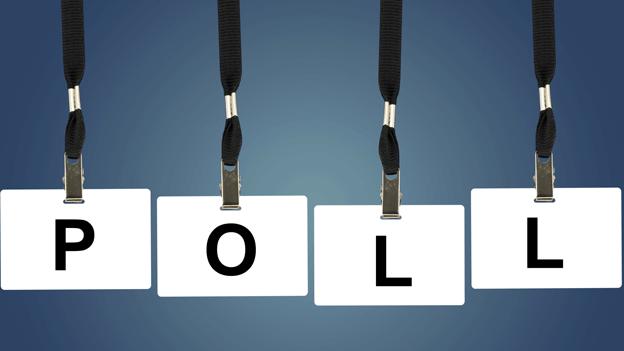
- Published15 December 2014
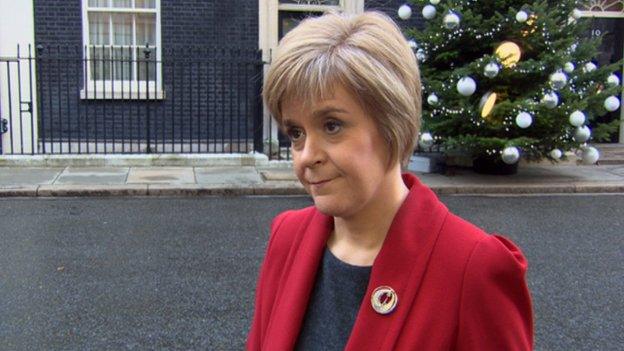
- Published14 January 2015
